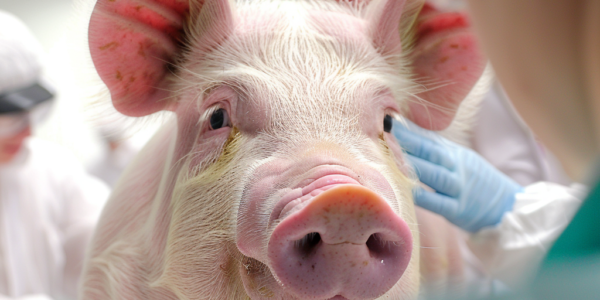Study Reveals New Genetic Basis for Corn Earworm Resistance to Transgenic Crops
A groundbreaking study from the University of Arizona reveals a new genetic basis for corn earworm resistance to genetically engineered crops, challenging previous assumptions about pest management. This research highlights the adaptive nature of pests and the urgent need for innovative strategies in agricultural practices to combat evolving threats to crop protection.
Navigating Privacy and Breakthroughs in Multiple Sclerosis Research
In today’s digital age, understanding privacy choices is crucial as users navigate online platforms. Essential cookies ensure basic functionality, while optional cookies enhance user experience but may involve data sharing with third parties. Recent research in regenerative medicine highlights a groundbreaking study on CRISPR-edited cells that could improve remyelination in Multiple Sclerosis, offering hope for new treatments. Stay informed about your online privacy and the latest scientific advancements.
AI and Genetic Engineering: Pioneering the Future of Bespoke Proteins for Environmental Solutions
Recent advancements in artificial intelligence and genetic engineering are revolutionizing biotechnology, enabling the creation of bespoke proteins that could tackle environmental challenges like climate change and plastic waste. With AI’s ability to predict protein structures and gene editing technologies like CRISPR, researchers can design proteins for targeted applications in agriculture and medicine, paving the way for innovative solutions. However, ethical considerations surrounding these technologies remain crucial as we explore their vast potential.
Virginia Tech Scientists Develop Genetic Strategies to Combat Mosquito-Borne Diseases
Virginia Tech scientists are advancing mosquito control by using genetic manipulation to combat diseases like Zika and dengue. Their research identifies genetic incompatibilities in mosquito populations, aiming to create all-male populations that could drastically reduce female numbers and disease transmission. This innovative approach promises a sustainable alternative to traditional insecticides, addressing both public health and environmental concerns.
Genetically Engineered Plants to Produce Human Milk Sugars for Healthier Infant Formula
Genetically engineered plants could soon produce human milk sugars, making infant formula healthier and more affordable. Scientists have developed a method to genetically modify plants to produce human milk oligosaccharides, which could lead to more nutritious and cheaper infant formulas that mimic the benefits of breast milk more closely. Researchers at the University of California, Berkeley and the University of California, Davis have made significant progress in bridging this gap by genetically engineering plants to produce these crucial sugars, known as human milk oligosaccharides (HMOs). Their study, recently published in the journal Nature Food, could help create a healthier, more affordable infant formula.
Djibouti Releases Genetically Engineered Mosquitoes to Combat Malaria
Djibouti launches groundbreaking initiative in the fight against malaria by releasing genetically engineered mosquitoes to combat the invasive Anopheles stephensi mosquito. The Djibouti Friendly Mosquito Programme, a collaborative effort, aims to reduce urban malaria cases. Uganda also plans to implement a similar strategy targeting Anopheles funestus. Genetically modified mosquitoes were previously released in Burkina Faso in 2019 to prevent offspring production.
Controversy Surrounds Mislabeling of Bioengineered Tomato Seeds
The recent mix-up involving bioengineered tomato seeds has sparked concerns about the inadvertent spread of GMO crops. The controversy surrounding the Purple Galaxy Tomato, initially touted as non-GMO but later revealed to be a GMO variety known as the Purple Tomato, has reignited debates on biodiversity and GMO seed dissemination. Despite initial skepticism, the Purple Tomato, engineered to be high in antioxidants, has been approved for sale in the US. The incident underscores the complexities of seed production and distribution in an era where genetic engineering is prevalent.
CRISPR Technology: Revolutionizing Medicine and Healthcare
The approval of the world’s first CRISPR therapy to treat sickle cell disease and beta-thalassemia patients signifies a significant milestone in the field of gene editing. CRISPR technology has potential applications in targeting and treating various types of cancer, combating AIDS, addressing cystic fibrosis, muscular dystrophy, Huntington’s disease, blood disorders, and even COVID-19. As CRISPR technology continues to advance, its potential applications in medicine and healthcare are expanding, offering new avenues for personalized medicine.
Chinese Scientist He Jiankui Resumes Genome Editing Research
Controversial scientist He Jiankui, known for creating genetically edited babies, has returned to his lab to focus on Alzheimer’s and genetic disease research. Despite backlash and legal consequences, he plans to resume human embryo genome editing within regulations. His actions have sparked global condemnation and reignited debates about the ethical boundaries of gene editing.
Genetically Modified Pigs Offer Hope for Organ Transplantation
Scientists are making groundbreaking strides in the field of organ transplantation, offering hope for the thousands of patients awaiting life-saving procedures. The latest development involves genetically modified pigs, which could potentially put an end to the shortage of organs for transplants. Researchers are optimistic about the potential of gene-edited animals to serve as a new source of organs for transplantation, marking a significant advancement in the field of medical science.










